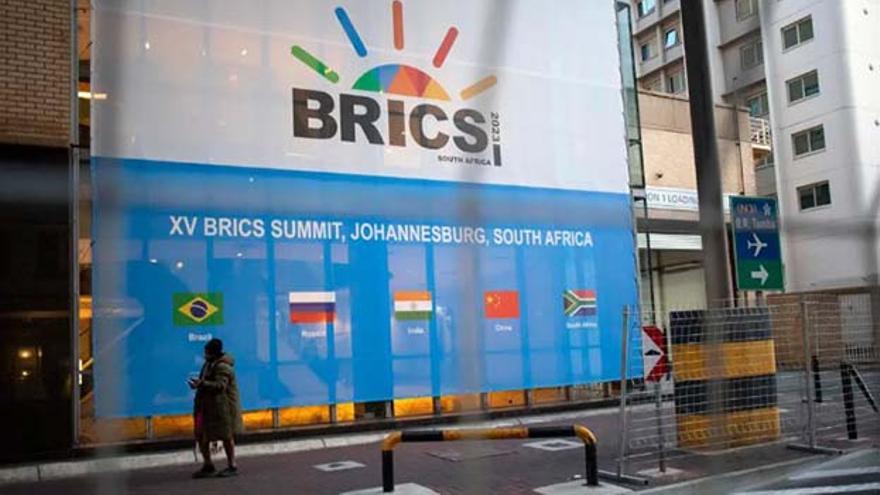
![]() EFE (via 14ymedio), Johannesburg, 26 August 2023 — BRICS, the group of emerging economies (Brazil, Russia, India, China and South Africa), enjoyed the spotlight this week when announcing in Johannesburg the accession to the bloc of six countries, including Argentina, and left an unknown in the air: will that expansion mark the beginning of a new world order?
EFE (via 14ymedio), Johannesburg, 26 August 2023 — BRICS, the group of emerging economies (Brazil, Russia, India, China and South Africa), enjoyed the spotlight this week when announcing in Johannesburg the accession to the bloc of six countries, including Argentina, and left an unknown in the air: will that expansion mark the beginning of a new world order?
In the midst of enormous anticipation, the president of South Africa, Cyril Ramaphosa, broke the news last Thursday to hundreds of journalists who crowded into a room at the Sandton Convention Center, in Johannesburg’s financial district, where the last day of the group’s XV Summit of Heads of State and Government took place.
The leaders of the bloc had approved access to the club of Argentina, Saudi Arabia, Egypt, Ethiopia, the United Arab Emirates and Iran, which will become “full members” beginning on January 1, 2024, the president revealed.
Without clarifying the accession criteria, Ramaphosa specified that there is “a consensus on the first phase of this expansion process, and other phases will follow.”
Some forty countries had expressed the desire to join the bloc, according to South Africa, which this year holds the rotating presidency of the bloc, with formal requests received from 23 nations, including Argentina, Bolivia, Cuba, Honduras and Venezuela.
Brazil, Russia, India and China created the BRICS in 2006, an informal club that was joined by South Africa (the S of the acronym) in 2010.
These countries represent more than 42% of the world’s population and 30% of the planet’s territory, as well as 23% of gross domestic product (GDP) and 18% of world trade.
Since then, the group, a champion of the Global South and scourge of the western global hegemony, had not opened its doors to anyone due to disagreements among its members.
China, the second global economy, bet very strongly on expanding the BRICS – which are eager for more weight in international institutions, dominated by the United States and Europe – because Beijing is looking for more geopolitical muscle against Washington, the world’s first economy.
The Chinese president, Xi Jinping, could not contain his euphoria and called the expansion “historic,” and his colleagues in the bloc joined in, although with more temperate assessments.
The president of Brazil, Luiz Inácio Lula da Silva, who bid for the entry of neighboring Argentina, welcomed the new members and said that “the BRICS will continue to be the engine of a more just world order.”
But, EFE asked, what does the expansion mean for that world order? “This is a historic moment (…) that can completely change the relationship of what we saw so far; that is, a unipolar world is passing very quickly to a multipolar world,” replied the famous Uruguayan journalist Jorge Gestoso, who has interviewed numerous international leaders in his long career.
Gestoso believes that the planet is heading towards a new international order but warns that the “unipolar world” is not going “to stand idly by (…), and we might see bumps in the road ahead.”
An expert in international policy, Sanusha Naidu, of the Institute for Global Dialogue of South Africa, was more cautious in statements to EFE. She does not necessarily see a new world order but does admit that the expansion of the BRICS alters “the dynamics of that world order by breaking down barriers.”
Although there is no doubt that the enlargement offers the bloc greater economic and political influence, it could also provoke new tensions between the members and the West, given the inclusion, for example, of Iran, a staunch enemy of the United States.
It should be remembered in this regard that Russia and Iran share a common cause in their fight against sanctions and the diplomatic isolation against them led by Washington, and that they deepened their economic ties after Moscow’s invasion of Ukraine.
The entry of Argentina, in addition, could generate problems in the group “because there is still the possibility of a change of government” in the country, Brazilian analyst Gustavo de Carvalho, of the South African Institute of International Affairs, told EFE.
The presidential candidate of the opposition coalition Juntos por el Cambio [Together for Change], Patricia Bullrich, expressed on Thursday her “opposition position” to the entry of Argentina.
“Argentina, under our government, will not be in the BRICS,” Bullrich warned in a speech, referring to the general elections on October 22.
On the economic and commercial terrain, Gestoso pointed out that the expansion, which includes three major oil producers (Saudi Arabia, Iran and the United Arab Emirates), could lead to a “tectonic movement” in the development of “a new financial architecture that can change the rules of the world’s game.”
In fact, this is where the BRICS have achieved their greatest success so far: the establishment of the New Development Bank, an organization inspired by the World Bank to finance infrastructure projects.
While the West digests the expansion of the BRICS, UN Secretary General António Guterres recalled on Thursday at the bloc summit that “today’s global governance structures reflect yesterday’s world,” and, therefore, “they must be reformed to reflect the current power and economic realities.”
Translated by Regina Anavy
_______________________
COLLABORATE WITH OUR WORK: The 14ymedio team is committed to practicing serious journalism that reflects Cuba’s reality in all its depth. Thank you for joining us on this long journey. We invite you to continue supporting us by becoming a member of 14ymedio now. Together we can continue transforming journalism in Cuba.
